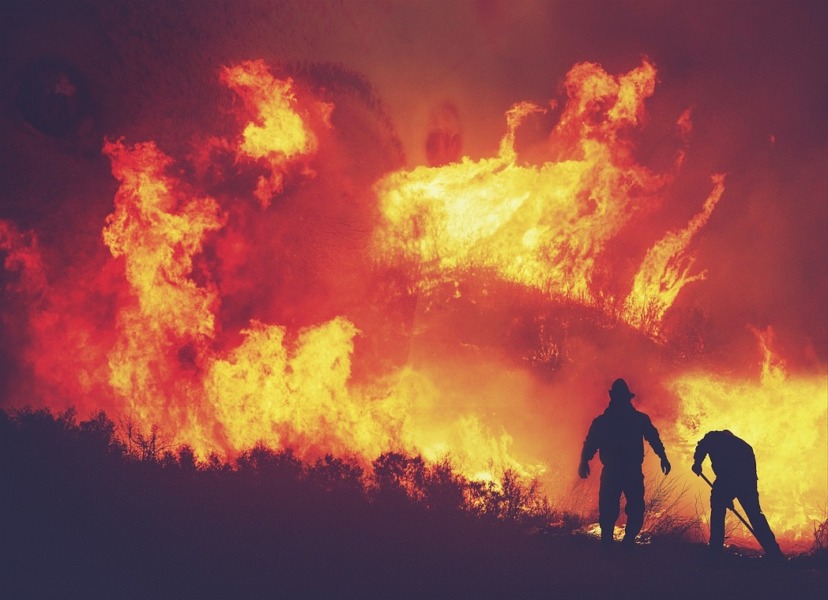2023, The Year of Wildfires: A Global Call to Action in the Face of Climate Crisis
- TDS News
- Breaking News
- August 16, 2023

The year 2023 has been marked by an unprecedented surge in wildfires, leaving a trail of destruction across the globe. These fires have swept across continents, sparing no corner of the world. In Canada, the provinces of BC, Ontario, Alberta, and Halifax have been grappling with the loss of tens of millions of hectares of forests, homes, and livelihoods, all consumed by the relentless flames. The United States, too, has witnessed its share of devastation, particularly in Maui, Hawaii, where the delicate ecosystem has fallen victim to the havoc wreaked by the fires. Meanwhile, Australia, still recovering from its devastating blazes, continues to combat new outbreaks. The widespread occurrence of these events emphasizes the interconnectedness of our planet and underscores the urgent necessity for a collaborative global response.
The wildfire surge has prompted experts to analyze the factors behind their intensification. While these natural events have been observed, the concerning rise in their frequency and strength can be linked to climate change. Elevated global temperatures, prolonged droughts, and shifting weather patterns establish ideal circumstances for the proliferation of these incidents. In Canada and the US, the convergence of hotter and drier summers with bark beetle infestations has rendered extensive forested areas susceptible to ignition. This results in a harmful feedback loop: as one significant wildfire releases substantial quantities of carbon dioxide into the atmosphere, it further amplifies global warming, exacerbating the conditions that nourish subsequent fires.
The year has illuminated the critical urgency surrounding climate change and its consequences. The aftermath left when the flames are extinguished is a stark reminder that the time for half-measures has passed. Urgent action is required to mitigate the impact of climate change and prevent further escalation of wildfires. Governments, industries, and individuals must collectively transition to cleaner energy sources, reduce carbon emissions, and implement sustainable land management practices. The global community must collaborate to drive policy changes, invest in renewable technologies, and create resilience strategies to protect vulnerable regions. It is also important to consider the need for fossil fuels and the significant role they still have to play in the global economy.

Combating the wildfire crisis demands a multi-faceted approach that spans local, national, and international levels. On a local scale, communities must engage in effective land management practices, such as controlled burns and defensible space creation, to reduce the risk of wildfires spreading. Adequate funding and resources should be allocated to firefighting agencies, enabling them to respond swiftly and effectively to fire outbreaks. Nationally, governments must prioritize climate-friendly policies and regulations, incentivizing the transition to renewable energy and sustainable land use.
Globally, collaboration is key. A united effort involving governments, NGOs, and international organizations can pool resources, share expertise, and coordinate wildfire responses. A robust early warning system, enabled by advanced satellite technology and data analytics, can provide crucial information to predict and manage fire outbreaks. Furthermore, investing in research and innovation can yield new firefighting techniques and materials, enhancing our ability to control and contain wildfires.
The impact of wildfires is beyond calculation, causing communities to crumble and ecosystems to suffer irreparable harm. As a global community, we are morally obligated to stand by those impacted by these events and aid in reconstructing their lives. Ensuring sufficient funding for relief initiatives, housing, and recovery is crucial. Acknowledging the heroic endeavours of firefighters, who bravely risk their lives to safeguard communities, is of utmost importance. Firefighters worldwide, including Canada, the United States, Chile, Costa Rica, Australia, New Zealand, South Africa, and the esteemed Armed Forces, exemplify the genuine essence of worldwide unity as they swiftly respond to support vulnerable regions.
As we confront the undeniable link between climate change and the intensification of wildfires, a critical sense of urgency propels us toward a future of resilience and sustainability. By enacting effective policies, transitioning to cleaner energy, and fostering international cooperation, we can combat this crisis and build a safer, more sustainable world for future generations. Through united efforts, we can work towards a global society that takes a stand against the infernos that threaten our planet.








